How Solar Panel Inverters & Batteries Work for UK Businesses
Solar panel inverters are essential for converting the DC energy from solar panels into AC electricity used by your business. Coupled with deep cycle batteries, these systems store excess energy for later use, ensuring a constant power supply even during cloudy days or at night.
As solar energy continues to gain traction as a sustainable and cost-effective solution for powering commercial premises, offices, and industrial operations across the UK, understanding the key components of a solar panel system design is essential. One of the most critical elements in any solar energy setup is the solar panel inverter a device that converts the direct current (DC) power generated by solar PV panels into alternating current (AC) power, which is essential for running your business operations.
In addition to solar inverters, another crucial component for off-grid and backup solar power systems is the deep cycle battery. These batteries store excess energy produced by your solar panels, ensuring that your business remains operational even during low sunlight periods or power outages, a particularly valuable feature given the unpredictable UK weather.
This blog provides an in-depth look into how solar inverters work, the role of deep cycle batteries, and how these components interact to create an efficient and reliable solar power system tailored to the needs of UK businesses and commercial operations.
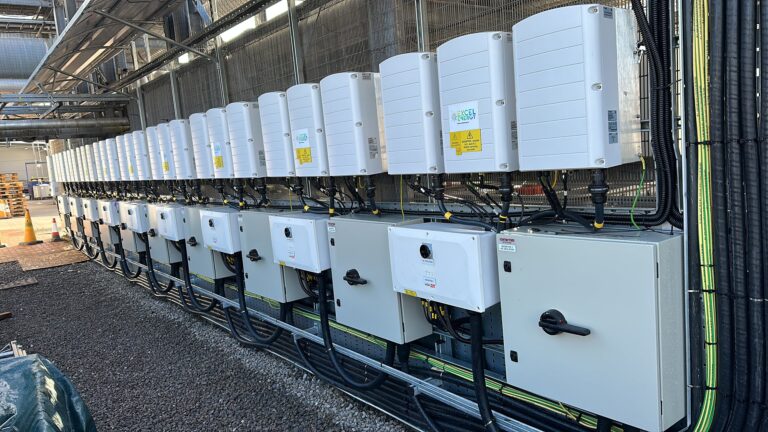
How Do Solar Panel Inverters Work for Business Applications?
Before exploring the specifics, it’s important to address a key question: What role does an inverter play in a commercial solar system?
A solar power inverter is integral to any solar panel system design as it converts the DC electricity generated by your panels into AC power that your business’s equipment, lighting, HVAC systems, and other appliances require. For commercial and industrial operations where reliability and efficiency are paramount, the performance of your solar inverter directly impacts your energy savings and operational uptime.
Types of Solar Inverters in the Commercial Sector
In the UK market, various types of solar energy inverters are available, each designed to meet different installation scales and business requirements:
2. Microinverters
Attached to each individual solar panel, microinverters maximise power output by addressing issues like partial shading or panel mismatch—common challenges in urban commercial settings with variable roof orientations.
1. String Inverters
The most common and cost-effective solution for many businesses, string inverters connect multiple solar PV panels to a single inverter. They work well for installations with minimal shading and straightforward roof designs.
3. Hybrid Inverters
Combining solar energy conversion with battery energy storage capabilities, hybrid inverters offer seamless energy management. They are ideal for commercial solar panel systems that incorporate deep cycle batteries, ensuring continuous operations even during power cuts or periods of low solar generation.
4. Central Inverters
Typically used in large-scale commercial or utility-scale projects, central inverters handle high capacities and are designed to support extensive solar arrays. They are best suited to businesses with significant energy demands and available installation space.
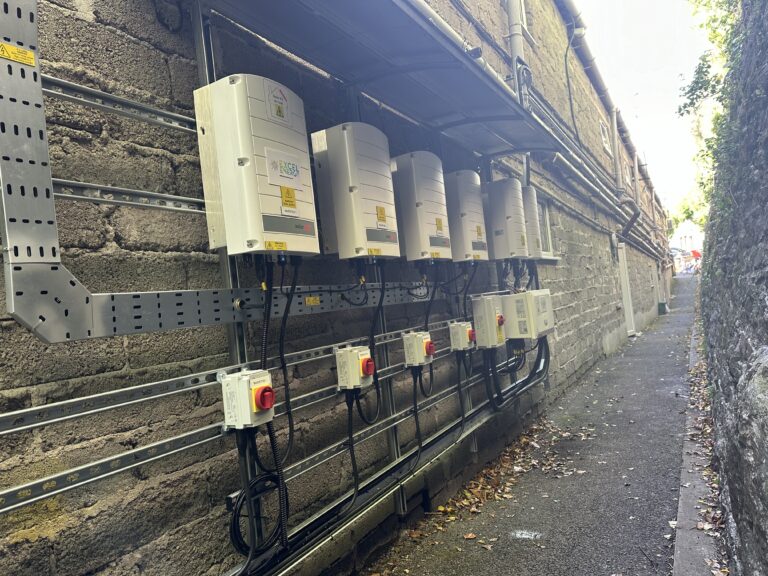
How Does a Solar Inverter Work in a Business Setting?
Here’s a step-by-step breakdown of how solar inverters work to support commercial operations:
2. DC to AC Conversion
The solar panel inverter takes this DC power and converts it into AC power, making it compatible with the UK’s commercial electricity grid and your onsite equipment.
1. Solar Panel Power Generation
Solar PV panels capture sunlight and generate DC (direct current) electricity through the photovoltaic effect, which is then converted by an inverter into AC (alternating current) for use in homes and businesses.
3. Power Optimisation and Regulation
Modern ENA type tested solar inverters come equipped with advanced optimisation features that adjust voltage and frequency, ensuring peak performance and adherence to industry standards for commercial installations.
5. Grid Interaction (for Grid-Tied Systems)
For grid-connected commercial systems, providing DNO permits any surplus solar power to be exported back to the National Grid. Under the Smart Export Guarantee (SEG) scheme, this can generate additional revenue or credits, reducing your overall energy costs.
4. Electricity Distribution
The converted AC power is consumed by onsite loads through various distribution boards and allocated to various operational needs from lighting and machinery to HVAC and IT systems.
This process repeats continuously as long as sunlight is available, ensuring a reliable and sustainable energy supply for your business.
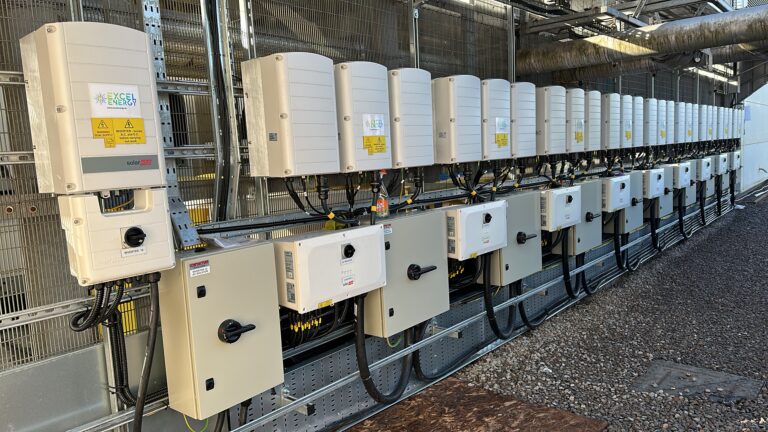
What Is a Deep Cycle Battery for Commercial Use?
A deep cycle battery is a rechargeable battery designed to provide a consistent power output over extended periods. Unlike automotive batteries that deliver short bursts of power, deep cycle batteries are built to be discharged and recharged repeatedly, ideal for commercial applications where dependable energy storage is crucial.
Types of Deep Cycle Batteries Commonly Used in UK Businesses
2. Lithium-Ion Batteries
Though more expensive upfront, lithium-ion batteries offer higher efficiency, longer lifespan, and reduced weight. They are increasingly favoured in modern commercial solar systems where space and performance are critical.
1. Lead-Acid Batteries
A cost-effective solution commonly used in commercial installations, available in both flooded and sealed variants. Sealed versions require less maintenance, which can be a significant advantage for busy operations.
4. AGM (Absorbent Glass Mat) Batteries
These batteries offer enhanced durability and efficiency, making them well-suited to the demanding energy needs of commercial operations.
3. Gel Batteries
A variation of lead-acid batteries that use a gel-based electrolyte, reducing maintenance and improving overall longevity, an attractive option for businesses prioritising low-maintenance systems.
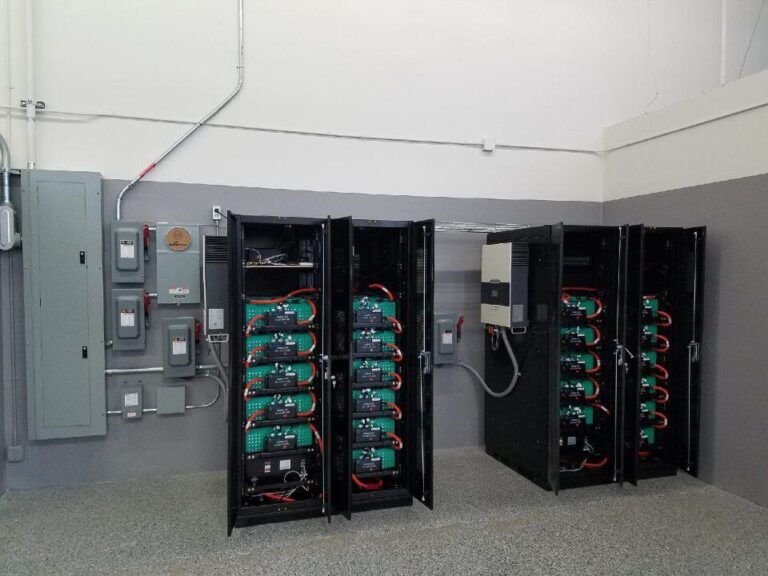
How Deep Cycle Batteries Work in a Commercial Solar System
When integrated into your solar panel system design, a deep cycle battery stores excess energy generated during peak sunlight hours. This stored energy can then be utilised during non-solar hours—ensuring that your business remains fully operational even during overcast weather or at night. A robust solar power inverter converts the stored DC energy back into AC power, making it immediately available for critical business functions.
How Does a Solar Inverter Work with a Battery System in a Commercial Environment?
In commercial installations with battery energy storage systems (BESS), the solar inverter’s role becomes even more crucial. Here’s how it integrates with a battery system to support your business operations:
2. DC-AC Conversion & Battery Management
A hybrid solar panel inverter intelligently manages the energy flow by deciding whether to supply power directly from the solar panels, utilise stored battery power, or, if necessary, draw from the grid.
1. Energy Collection & Storage
Solar PV panels generate electricity that is either used immediately or stored in a deep cycle battery for later use, ensuring energy availability during peak operational hours.
3. Uninterrupted Power Supply
In the event of a grid outage, the solar inverter automatically activates to battery power, ensuring that your business operations, critical IT infrastructure, and security systems remain uninterrupted.
This seamless integration is vital for commercial operations that cannot afford downtime, providing a resilient and dependable energy system.
Choosing the Best Power Inverter for Your Commercial Solar System
When selecting the best power inverter for your commercial solar setup, consider the following factors:
Inverter Efficiency
Higher efficiency models reduce energy loss during conversion. A hybrid solution is the most effecient at maximising your return on investment.
System Size & Energy Needs
A solar system with the appropriate capacity inverter ensures accurate assessment of your business’s energy consumption for optimal efficiency.
Battery Compatibility
Ensure the solar power inverter is compatible with your chosen deep cycle battery type, particularly if incorporating a storage solution.
Waveform Type
Pure sine wave inverters are recommended for sensitive business electronics, while modified sine wave inverters can be a more budget-friendly option, albeit with some performance trade-offs.
For UK businesses, whether your solar system is grid-tied, off-grid, or hybrid, selecting an inverter that complies with local regulations and industry standards, such as those certified by the Microgeneration Certification Scheme (MCS), is critical for a successful installation.
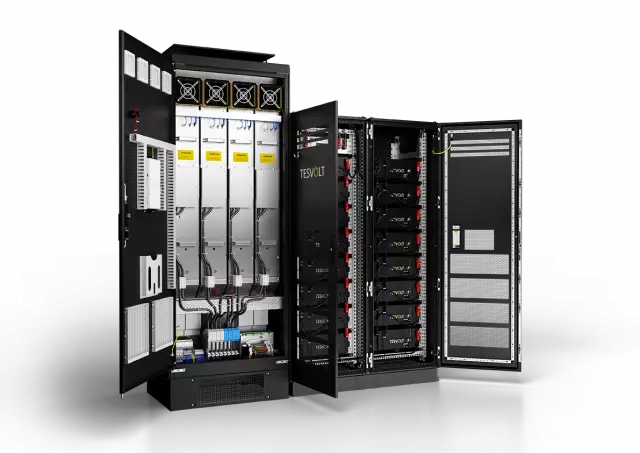
Solar Inverters Explained:Key Takeaways for UK Businesses
Variety of Options:
String, micro, hybrid, and central inverters offer distinct benefits based on your business’s scale and operational requirements.
Solar Inverters:
Essential for converting DC electricity from solar panels into AC power, ensuring compatibility with the national grid and commercial operations.
Deep Cycle Batteries:
Provide reliable energy storage to maintain uninterrupted operations during low-sunlight periods or power outages.
Selection Criteria:
Choose a solar inverter based on system size, efficiency, battery compatibility, waveform type, and adherence to UK electricity standards.
Hybrid Systems:
Integrate battery storage and smart energy management to maximise efficiency and resilience.
Inverter Types
String, micro, hybrid, and central inverters cater to different business needs and system scales..
Understanding how solar inverters work and the critical role of deep cycle batteries is key to designing an efficient, cost-effective, and reliable solar power system for your business. By making informed decisions about your solar panel system design, you can harness the benefits of clean, renewable energy while ensuring your operations remain stable and dependable for years to come.
Take control of your commercial energy future today. Discover how understanding solar inverters and deep cycle batteries can transform your business into a model of efficiency and sustainability.
Ready to switch to clean, renewable energy? Contact us today to design a turnkey commercial solar panel system tailored to your unique business needs. Start saving on energy costs, reduce your carbon footprint, and ensure reliable power for your operations, even when the weather isn’t cooperating. Let’s make your energy future more sustainable!
